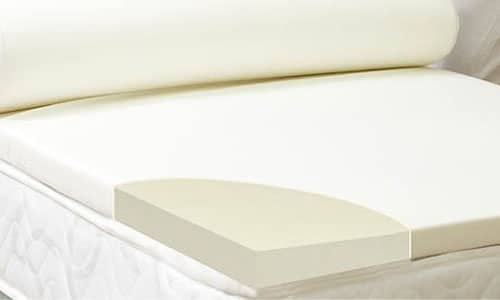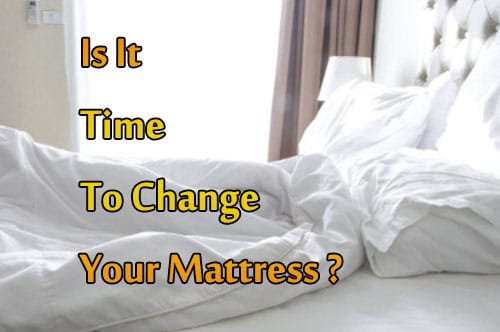According to most experts, the service of a premium mattress may stretch to between 7 and 10 years depending on the quality. However, no matter how good the mattress is, it is bound to fall prey to the forces of wear and tear.
When this happens, the mattress begins providing less support subsequently triggering symptoms such as back and joint pains and even lowering the quality of sleep significantly. Replacing a worn-out mattress with a new one can have numerous benefits to an individual’s quality of sleep.
Unfortunately, even a worn-out mattress may seem comfortable to the user, and this makes it particularly hard to know whether or not there is a need to replace the mattress. The good news is that there are several ways to tell if a mattress needs a replacement!
Ten Ways To Check If You Need To Toss Your Mattress
1. Difficulty Waking Up
A worn-out mattress is not capable of providing the same support as it used to when it was new. Ultimately, sleeping on such a mattress reduces the quality of sleep subsequently leading to less rest and eventually making it harder to wake up in the morning due to a continued feeling of exhaustion.
To add on that, one may feel tired, sleepy and even grumpy all through the day. In addition to that, sleeping on a worn-out mattress often leads to neck pain, shoulder pain, and even back pain.
Sometimes the pain may even last through the day or even become a permanent fixture every morning.
2. The Mattress Sags
Sagging is one of the clearest signs that a mattress needs replacement. Any worn-out or old mattress (including spring and memory foam mattresses) is bound to develop sags or lumps due to the pressure of continued use.
The wear and tear also mean that the mattress loses its ability to bounce back. Consequently, the mattress develops more permanent impressions. This is quite common with old memory foam mattresses. In some cases, the mattress may not sag but may still hammock the person sleeping.
Lumps and impressions on the mattress reduce its ability to provide support. They also signify the loss of cushioning which is detrimental to the comfort of the mattress. According to experts, lumps and impressions that are beyond 1.5 inches in depth may signal the need for a mattress replacement.

3. If The Mattress Is 7 Years Or Older
Like mentioned earlier, premium mattresses are estimated to have a utility lifetime of between 7 and 10 years.
According to experts, using a mattress for 7 years is equivalent to spending approximately 17,885 hours in bed (7 hours every night).
From 7 years, the support of the mattress reduces significantly. To avoid the adverse impacts of a depleted mattress, getting a new one is advised.
4. Anywhere But The Bed
In some cases, some people may find themselves sleeping better when they sleep in other places other than their beds. For example, some people may develop a preference for sleeping on the couch or in another bedroom (other than theirs).
Other people may discover that they sleep better when they spend the night in hotels or even in their friends’ homes.
All these are clear indications that the mattress at home is neither comfortable nor supportive. Anyone who experiences this should seriously consider replacing the mattress.
5. Restless Partner
While conditions such as depression and insomnia may cause restlessness at night, mattresses also play a significant role in causing anxiety.
People can tell they need to replace their mattresses when they start noticing that their partner is more restless. This is a particularly good sign in cases where the partner does not have a history of sleep-related conditions.
6. The Individual Has Aged
Despite a mattress having a lifespan of between 7 and 10 years, it is possible for the lifespan to grow shorter simply because a person has aged.
As a matter of fact, even mattress preferences change with age. The need for firm bed increases as people grow old. Simply put, growing older may necessitate a new mattress particularly when age-related conditions such as back pain are involved.
7. Spring Mattress Squeaks
This sign is mostly applicable to spring mattresses. While they are great when new, old spring mattresses are noisier and less comfortable than new ones. Because of the extended pressure on the springs, they may start squeaking.
The constant squeaking particularly when turning or moving around in bed is a tell-tale sign of the need for a new mattress.
8. The Goldilocks Effect On Memory Foam Mattresses
Although memory foam mattresses are considered good quality mattresses, they are often quite responsive to changes in temperature.
As a result, the mattress may seem hotter and softer on hot nights while on cold nights, the mattress may seem cooler and even firmer. With time, however, the temperatures make the mattress either firmer (in cold temperatures) or softer (in warmer temperatures).
Memory foam mattresses that are too hard or too soft may signify a need to replace the worn-out mattress.

9. Allergies
With time, most mattresses tend to facilitate the accumulation of allergens such as mold, mildew and dust mites. Continued accumulation of these allergens also means that the users of the mattress are exposed to these allergens for extended periods of time.
Such mattresses may play a major role in triggering allergic reactions such as sneezing or waking up with a blocked nose.
Experiencing allergic reactions more often especially when around the mattress makes it clear that a new mattress is required. Mattress experts recommend investing in mattresses that are hypoallergenic
10. Other Practical Signs
For most people, weight tends to change depending on factors such as health, diet, medical procedures such as surgery and even age. The changes in weight may necessitate a change in the mattress particularly if the weight has significantly reduced.
Other indications that it is time to replace a mattress include getting a new partner or even developing certain conditions such as extreme back pains.
Pregnancy may also necessitate a new mattress. During pregnancy, women tend to require greater support and more comfort.
Pregnant women are prone to more exhaustion and even more back pain. It is advisable for pregnant women to get new mattresses that can provide them with greater support and comfort.
